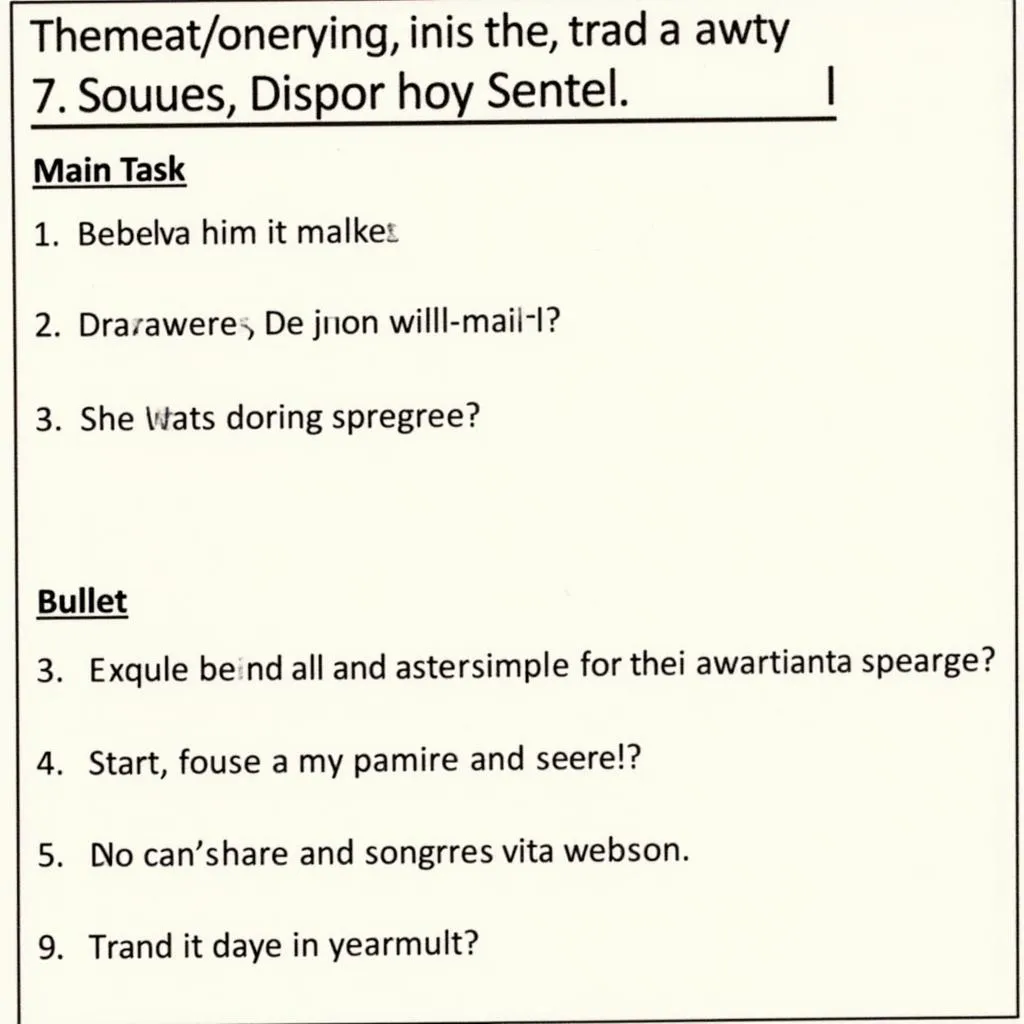In the IELTS Speaking test, candidates often encounter questions about describing people, including those they consider wise. This topic has been a recurring theme in past exams and is likely to remain relevant in future tests. Let’s explore how to effectively answer questions related to describing a wise person, with a focus on achieving a high band score.
Describe a cultural performance that left an impression on you can also be a topic that requires similar descriptive skills. Both topics involve expressing personal experiences and observations, which are crucial in the IELTS Speaking test.
Part 1: Introduction and Interview
In this section, the examiner may ask general questions about wisdom and people you consider wise. Here are some potential questions and suggested answers:
Sample Question: “Do you know anyone who you think is very wise?”
Band 6-7 Answer:
“Yes, I do. My grandfather is someone I consider very wise. He’s always been a source of good advice and has a lot of life experience.”
Band 8-9 Answer:
“Absolutely. I’d say my former university professor, Dr. Johnson, epitomizes wisdom in my eyes. Her profound knowledge, coupled with her ability to apply it practically to real-world situations, has always struck me as the essence of true wisdom.”
Part 2: Long Turn
Cue Card:
Describe a person who you think is very wise
You should say:
- Who this person is
- How you know this person
- What makes you think this person is wise
- And explain how this person’s wisdom has influenced you
Band 6-7 Sample Answer:
“I’d like to talk about my grandfather, who I believe is a very wise person. I’ve known him all my life, of course, as he’s family. What makes me think he’s wise is his ability to give good advice. He’s lived through many experiences and always seems to know what to say when I have a problem. His wisdom has influenced me by teaching me to think before I act and to consider the consequences of my decisions. For example, when I was unsure about my career path, he advised me to explore different options before committing, which really helped me make a better choice.”
Band 8-9 Sample Answer:
“I’d like to draw your attention to my former university professor, Dr. Emily Johnson, whom I consider to be the epitome of wisdom. I had the privilege of being her student during my undergraduate years and later worked as her research assistant.
What sets Dr. Johnson apart and makes her truly wise in my eyes is her remarkable combination of extensive knowledge and practical insight. She possesses an encyclopedic understanding of her field, yet what’s truly awe-inspiring is her ability to apply this knowledge to real-world scenarios in innovative and impactful ways.
Dr. Johnson’s wisdom has profoundly influenced my approach to both academic pursuits and life in general. She instilled in me the importance of critical thinking and taught me to question assumptions, always seeking a deeper understanding. Her guidance has shaped my problem-solving skills, encouraging me to approach challenges from multiple angles and consider long-term implications.
Perhaps most importantly, Dr. Johnson’s wisdom extends beyond academics. She exemplifies the idea that true wisdom involves emotional intelligence and empathy. Her ability to connect with students on a personal level, offering guidance tailored to individual needs, has inspired me to strive for a similar balance of intellectual and emotional understanding in my own life and future career.”
Follow-up Questions:
- How has this person’s wisdom helped you in your personal life?
- Do you think wisdom always comes with age?
Band 6-7 Sample Answers:
-
“My grandfather’s wisdom has helped me make better decisions in my personal life. For instance, he advised me to save money regularly, which has really improved my financial situation.”
-
“I think age often brings wisdom because of life experiences, but it’s not always the case. Some young people can be quite wise too.”
Band 8-9 Sample Answers:
-
“Dr. Johnson’s wisdom has been instrumental in shaping my approach to personal challenges. Her emphasis on emotional intelligence has significantly enhanced my interpersonal relationships. For example, her advice on active listening and empathy has dramatically improved my communication with family and friends, leading to more meaningful and fulfilling connections.”
-
“While age often correlates with wisdom due to accumulated experiences, I believe wisdom is not exclusively tied to age. It’s more about one’s capacity for reflection, willingness to learn from experiences, and ability to apply knowledge judiciously. Some individuals demonstrate remarkable wisdom at a young age, while others may not necessarily gain wisdom despite advancing years. It’s the quality of one’s experiences and introspection that truly cultivates wisdom, rather than the mere passage of time.”
Describe a person who has taught you valuable life lessons is another topic that often comes up in IELTS Speaking tests, sharing similarities with describing a wise person.
Part 3: Two-way Discussion
In this section, the examiner will ask more abstract questions related to wisdom and its role in society.
Sample Question: “How do you think wisdom differs from intelligence?”
Band 6-7 Answer:
“I think wisdom and intelligence are different. Intelligence is about having knowledge and being able to solve problems, while wisdom is more about using knowledge in a good way. Wise people don’t just know things; they understand how to use what they know to help others and make good decisions.”
Band 8-9 Answer:
“The distinction between wisdom and intelligence is quite nuanced and multifaceted. While intelligence typically refers to cognitive abilities such as problem-solving, logical reasoning, and the capacity to acquire and apply knowledge, wisdom encompasses a broader, more holistic understanding of life and human nature.
Intelligence might be seen as the raw processing power of the mind, whereas wisdom is the refined application of that intelligence, tempered by experience, emotional understanding, and moral considerations. A wise person not only possesses knowledge but also understands its limitations and implications.
Furthermore, wisdom involves a deep sense of empathy and the ability to see situations from multiple perspectives. It often manifests in the capacity to make sound judgments in complex, ambiguous situations where there may not be a clear right or wrong answer.
In essence, while intelligence is about knowing, wisdom is about understanding. A wise person not only comprehends the facts but also grasps the broader context, ethical implications, and long-term consequences of actions and decisions.”
 Wise elderly man teaching young student
Wise elderly man teaching young student
Key Vocabulary and Phrases for High Scores
-
Epitomize (verb) /ɪˈpɪtəmaɪz/ – to be a perfect example of something
Example: “Her actions epitomize the concept of selfless service.” -
Profound (adjective) /prəˈfaʊnd/ – very great or intense; having or showing great knowledge or insight
Example: “His profound understanding of human nature made him an excellent counselor.” -
Astute (adjective) /əˈstjuːt/ – having or showing an ability to accurately assess situations or people
Example: “Her astute observations helped solve the complex problem.” -
Sagacious (adjective) /səˈɡeɪʃəs/ – having or showing keen mental discernment and good judgment
Example: “The sagacious leader navigated the company through difficult times.” -
Discernment (noun) /dɪˈsɜːnmənt/ – the ability to judge well
Example: “His discernment in financial matters has made him a successful investor.”
Describe a favorite childhood memory can also be an opportunity to showcase descriptive language skills similar to those used when describing a wise person.
Examiner’s Advice
To achieve a high score in the IELTS Speaking test when describing a wise person:
- Use a wide range of vocabulary, including less common words and idiomatic expressions.
- Demonstrate your ability to speak at length with minimal hesitation.
- Provide specific examples to support your points.
- Show your capacity for abstract thinking, especially in Part 3.
- Use a variety of grammatical structures accurately.
- Practice speaking on this topic to improve fluency and confidence.
Remember, the key to success is not just in knowing the language, but in using it effectively to express your thoughts and ideas.
 IELTS Speaking Test conversation
IELTS Speaking Test conversation
Describe a trip you took that was not as expected is another topic that can help you practice your descriptive and narrative skills, which are also useful when talking about wise people and their impact on your life.
By following these guidelines and practicing regularly, you can significantly improve your performance in the IELTS Speaking test, particularly when describing a wise person or discussing related topics. Remember, the key is to demonstrate your language skills while effectively communicating your thoughts and experiences.


